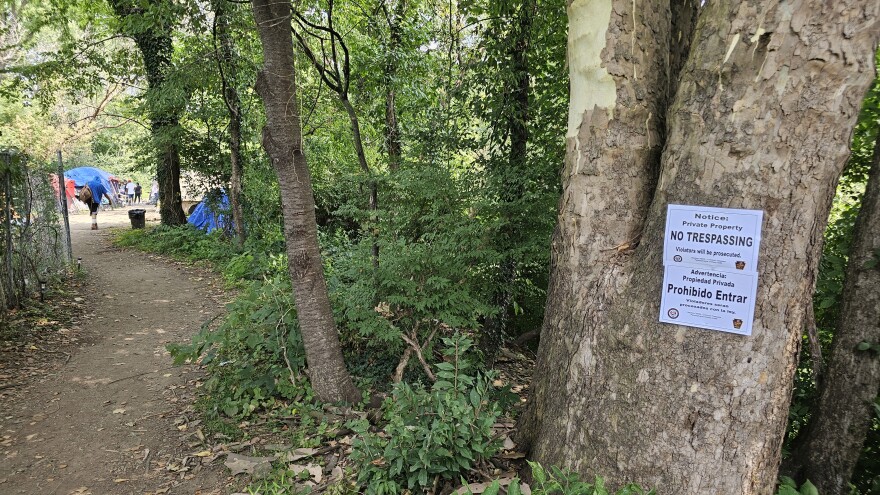ALLENTOWN, Pa. — A group of homeless people living near the Little Lehigh Creek say they were told this week to vacate the area.
But they don’t know when officials or police will return to make sure they’re gone.
A bill introduced Wednesday night by Allentown City Council would establish what co-sponsor Ce-Ce Gerlach called “standard operating procedures” for camp clearouts.
The measure — proposed by Gerlach and Natalie Santos — calls for a community response line through which homeless residents can request clean-ups and basic services.
Allentown workers would be required to conduct a risk assessment of each area where they know more than five people are living unsheltered, according to the bill, which defines how the city should prioritize and respond to those camps.
The bill also would ensure officials work with Allentown’s Commission on Homelessness, which had members voice frustration about a lack of coordination with city officials before Mayor Matt Tuerk ordered the eviction of an encampment along Jordan Creek.
And it would set clear timelines for contacting residents, ordering evictions and conducting them.
Policies and procedures needed, proposal says
The mayor in early August ordered the Jordan Creek camp to be cleared in less than three weeks. Residents said more than 100 people lived there some days.
Eviction notices left many stunned and without answers after getting reassurances they’d be allowed to stay.
Tuerk delayed the camp clearout until the end of September to give the Allentown YMCA more time to set up and open its expanded shelter ahead of schedule this year.
The measure proposed by Gerlach and Santos would require officials to notify the Commission on Homelessness about an impending closure at least 60 days before posting trespassing notices. Evictions could start 90 days later.
“Mr. Mayor, if my ordinance sucks, like you say it sucks, then fix it. Or write your own internal procedures.”Ce-Ce Gerlach, Allentown City Council
Under the proposal’s terms, residents of the Jordan Creek encampment — bulldozed Sept. 29 — would have been allowed to stay there through Nov. 5.
The potential cost of the proposal is unclear. It would require city employees who interact with homeless encampments to undergo additional training and compel the city to establish a database and complaint process.
Gerlach said she is pushing to codify procedures and timelines in an ordinance “because the [Tuerk] administration has no internal policies on how to manage all this.”
The councilwoman said she met Wednesday with the mayor. “He’s against the ordinance” because he believes it to be unenforceable and a potential liability to the city, she said after the meeting to a group of homeless residents fearing eviction.
“Mr. Mayor, if my ordinance sucks, like you say it sucks, then fix it,” Gerlach said. “Or write your own internal procedures.”
“If you're going to knock down a solution by working-class people — and literally unsheltered people themselves — at least come forth with a solution that's better than what has been proposed,” she said. “That has not happened. And that's what's infuriating.”
A spokesperson for the mayor did not respond Wednesday night to questions about Gerlach and Santos’ proposal.
'Political manipulation'?
Several homeless residents showed up to council’s Wednesday night meeting to support the measure. But none spoke as President Daryl Hendricks quickly referred the bill to a committee of the whole meeting, which is yet to be scheduled.
“I know … why this is being sent to a committee of the whole — so that everyone can be there and then it will get tabled."Ce-Ce Gerlach, Allentown City Council
Gerlach urged Hendricks to reconsider and send the bill for a review by council’s Parks and Recreation Committee, on which she and Santos serve.
Gerlach accused him of undermining her authority by often sending her legislative proposals to committees where she has no vote and cannot help push them through to the full council.
“We just had a couple, weeks ago, set up in West Park, which is parks and rec. We have many of them who are setting up along trails, which is parks and recreation. We have many of them who are setting up along waterways, which is parks and recreation,” she said.
“I know … why this is being sent to a committee of the whole — so that everyone can be there and then it will get tabled,” Gerlach said.
Tuerk "doesn't want this to go anywhere. He wants this to die. And I know that that's what this effort is," she said, accusing Hendricks of "political manipulation."
But Hendricks insisted a committee of all council members consider the measure “because of the impact this has on the entire city, not just parks and recreation.”
'Just trying to survive'
One of the men fearing eviction from the area he’s lived for the last three months told LehighValleyNews.com he’s struggling to move forward after losing his wife to suicide in June.
“I haven’t even really had time to grieve about it because I’ve always got to worry about” other things, like “making sure my site’s cleaned up" and staying ready to move at a moment's notice, he said.
“I’m just trying to survive.”
By giving homeless residents more time and notice before evictions, the proposal offers a chance to work toward a better situation, he said.
“We’ve got to worry about moving every so often; it doesn’t help us because then we’re concentrating on that and not concentrating on getting ourselves in a better situation,” he said.
The man, who moved back to the Lehigh Valley from North Carolina this summer, said he and many others want better but need some help to get there.
“They want you off the streets, but they don’t want to give you a place to go."A homeless man who attended Wednesday's Allentown City Council meeting
He praised local advocates, including the Lehigh Conference of Churches and Valley Health Partners’ Street Medicine team. But he questioned whether the city shares the same commitment to homeless residents.
“They want you off the streets, but they don’t want to give you a place to go,” he said Wednesday night outside City Hall, criticizing officials' failure to find a place for homeless residents to safely camp.


